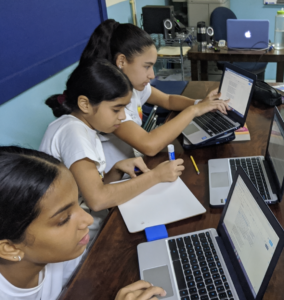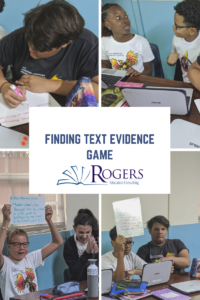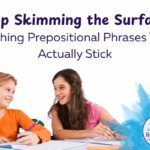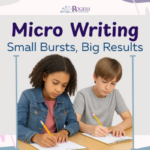There are several topics that make students groan when you announce them…proving a point with text evidence is among the top five. You would have thought I demanded that they turn in their Playstations or phones.
However, being a long-term thinking teacher, I know that this skill will help them be successful later in life, and of course, is required to be learned by our standards. Here are two ways I combat the groans and get students HAPPILY finding and using text evidence:
- Literature Circles. Over the years I have perfected literature circles. By perfected, I mean perfect for me! (I share all the ins and outs of literature circles in my on-site workshops). In a nutshell, each literature circle or book club in my classroom is carefully constructed around an essential question that is sure engross all the students in deep conversation. With plenty of direct instruction, this type of conversation forces students to refer back to the book to make and prove their points to their group. The way my book clubs are designed, students are constantly referring to text evidence and encouraging others to do the same. No groaning – promise!
- Group Game. Games are also a great way to reduce groans! While I love playing games, I loathe the
 idea of playing a game in class that does not have real value for student learning. The good news is that such a game doesn’t have to be complicated – kids are quite happy with a marker and a whiteboard. To play the “find your text evidence” game, I chose a text, one chapter from Hope Was Here by Joan Bauer, and on Day One we read the text using the strategy we had been studying – in our case, it was annotating inferences we made. On Day Two, I gave one whiteboard and marker to each group of four students. I had come up with 7 questions about the text and the students were charged, not with finding the answers necessarily, but with finding the text evidence that answered those questions.
idea of playing a game in class that does not have real value for student learning. The good news is that such a game doesn’t have to be complicated – kids are quite happy with a marker and a whiteboard. To play the “find your text evidence” game, I chose a text, one chapter from Hope Was Here by Joan Bauer, and on Day One we read the text using the strategy we had been studying – in our case, it was annotating inferences we made. On Day Two, I gave one whiteboard and marker to each group of four students. I had come up with 7 questions about the text and the students were charged, not with finding the answers necessarily, but with finding the text evidence that answered those questions.
I projected the question on the board and read it out loud, then the students had two minutes to work together to find the evidence that provided the answer. They wrote out the text and the paragraph number on the whiteboard and, after two minutes, they held up their boards to display their answers. Groups with the correct answer are awarded a point. I frequently reminded the groups that they had to work together, but they needed to be careful not to be too loud so other groups wouldn’t hear them. During this activity, the students were engaged in learning, quieter than normal, and begged to do it again!
How do you get your kids to locate text evidence?



